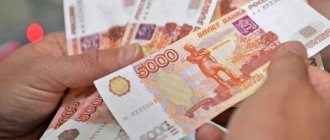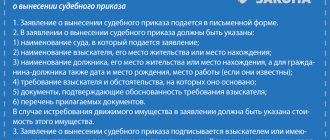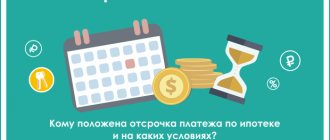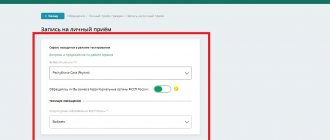What is the statute of limitations for loan debts in 2019?
This can happen either three years or ten years after the expiration of time.
Judicial practice shows that banks rarely make concessions to debtors. Only to those categories of clients who can confirm the facts of their insolvency with reliable evidence.
If the authorities at this level fail to act, contact the prosecutor’s office.
If the bank transfers the user's debt to a collection company, the statute of limitations on the loan does not start over.
The expiration of the claim period prevents the bank from going to court, but does not exclude the possibility of collecting debts
Sequence of debt collection
Decisions on debt collection are made by authorized bodies, but they are not the ones who distribute the money. If the debtor has several debt obligations, the order of debt collection and satisfaction of claims must be observed. This is especially important if there is obviously not enough money to satisfy all the requirements:
- Alimony, compensation related to work activity, in case of harm to health or life. At the death of breadwinners. To compensate for damage caused by criminal means. Compensation for moral damage.
- Payments of severance pay, salaries, if an employment contract has been drawn up. Royalties and payment for intellectual work.
- Payment of payments to the budget and extra-budgetary funds.
- Compensation for other incurred obligations.
The transition to a new queue of payments is carried out only after all previous ones have been paid.
How long does it take for the bank to submit a second application after the court decision is overturned?
This will be clear to you and easier for me. 3. From the moment you receive a copy of the default judgment, you will have only 7 (Seven) days to file an application with the court to cancel it.
Of course, it would be ideal to devote a separate article to this document. But I think it will appear a little later. Today I will tell you the main points that you must mention in your application to cancel the default judgment.
1. When making a decision in absentia, the court focuses on the fact that you were notified of the consideration of the case against you, but deliberately did not appear at court hearings.
Initiative and perseverance: we initiate production
To start the collection process, you must have two main documents:
- a corresponding statement containing all the information you have about the debtor;
- writ of execution (of course, correctly executed and not expired).
If the losing party decides to appeal the court decision to collect the debt in cassation, then the execution of the act must be suspended. But in any case, the bailiff is obliged to initiate proceedings, this should be remembered. And be sure to check the decree for possible errors (you will be surprised how often bailiffs make mistakes in the most unexpected places, even well-known geographical names), and closely monitor how the bailiff violated the deadline (six days).
How to cancel a court decision on a loan
In the latter case, the defendant also does not appear at the court hearing, but the court makes a decision in his absence, subject to the requirements of Article 167 of the Code of Civil Procedure of the Russian Federation. When canceling a default judgment (hereinafter referred to as the DJ), the following deadlines must be taken into account: Important! In addition to confirming the justifiability of failure to appear, the application for cancellation of the PO must contain a reference to evidence, the study of which may affect the content of the accepted PO.
ATTENTION! Due to recent changes in legislation, the information in this article may be out of date!
Blog of Alexander IZOTOV Founder of the VELES service
Today we will look at the question of what happens after the court order is canceled. What actions are required by the debtor?
What does a bank or microfinance institution do in case of cancellation? As soon as you have received a judge's ruling to cancel the court order, you must, of course, take it to the bailiff (if enforcement proceedings have been initiated). Be sure to make copies for yourself.
For the same reasons it cannot. This procedure is possible in the order of reversing the execution of a court decision; I will write about this in more detail in an upcoming article. PS Dear subscriber, what other questions remain regarding the court order?
Perhaps I missed something? Write your questions below in the comments. Best regards, Alexander Izotov.
What rights does the claimant have?
We will not list them all, but you, as a claimant, have the right, at a minimum, to wonder: what actions will the bailiff take? and when? The bailiff, accordingly, is obliged to satisfy this serious curiosity.
In addition, the claimant has the right:
- work with production materials and copy them;
- submit materials;
- participate in executive actions;
- petition, for example, to take measures to compel the debtor to perform;
- receive information from the bailiff about the measures he is taking, etc.
Another note of a practical nature: the bailiff has the right to give instructions on the implementation of specific enforcement actions, and since the law does not directly indicate that only the bailiff can initiate such instructions, then the recoverer also has the right to initiate the issuance of such instructions.
What can a bank do after a court decision is overturned?
Important! Bailiffs can also impose restrictions on the debtor's rights. This is due to the following circumstances: Collection of loan debt through the court has the following positive aspects for the borrower: Disadvantages of court proceedings:
- Non-payment may be compensated by property;
- The court's decision is binding on citizens;
- Information may be sent to the employer to withhold wages.
In addition, the judge provides legal assistance to the parties, interpreting the law if necessary.
- Payment of part of the salary to the bank.
- Seizure of property.
- Seizure of the debtor's property.
After the loan trial, what will happen to the borrower?
The amount is fixed and transferred to the bailiffs. But there is a nasty pitfall for the defendant here. When filing a claim, the bank indicates the debt and the judge accepts this amount.
But at the same time, the creditor continues to charge interest while the proceedings are ongoing. The judge fixes one figure, and the bank has another.
Unfortunately, this is a legal practice.
The remainder is sold to collectors. Important! It is in the interests of the debtor to point out this circumstance to the court. And if there has already been a court case regarding the loan, then it is necessary to further dispute the balance of the debt.
It is necessary to prepare for the trial in advance. So that everything looks correct from the point of view of the law. We contact the bank for restructuring.
We notify the bank of financial difficulties in writing. We go to court on our own to terminate the contract or wait for these actions from the creditor.
What do we offer
All of the above is just the tip of the “executive” iceberg; in practice, much more complex situations have to be resolved. The situation is complicated by the fact that appeals to the court with complaints about the actions (inaction) of bailiffs are not so often satisfied by the courts, and endless complaints to the senior bailiff and even the prosecutor will not lead to anything good. You can and should interact with the bailiff, but to do this you need to be able to do it.
Our lawyers have extensive experience in supporting enforcement proceedings
, and we know how to establish a constructive dialogue with bailiffs. Of course, if the bailiff committed a truly serious violation, we will definitely appeal it. But what is much more important is that we provide complete, comprehensive support for the execution of the decision right up to the desired result - the actual receipt of funds.
How long does it take for the bank to submit a second application after the court decision is overturned?
I have debts in several banks, I don’t refuse to pay, but at the moment there is no way. I wrote to the banks about this, but apparently they are not satisfied with the amount offered. At least they told me about it over the phone.
The letters are unfortunately the second copies. I didn’t keep it for myself, I sent it without notification (my mistake).
At the moment I pay 70% of alimony from my salary (by agreement - notarized) and 70% from my pension (through bailiffs based on this agreement). I have a car, but the bank still has 1.5 years to pay as collateral. registered with the organization. I have no housing or property.
What awaits me in the future and what are my chances of at least reducing monthly payments to 2 thousand for four banks in total. The court order can be canceled.
It is natural for the bank to go to court again through a lawsuit, in which case you will be able to reduce the amount of the penalty; the courts, as a rule, are cooperative in this matter. If possible, tell me how to reduce penalties in court.
Then your procedure is as follows. Submit an application to cancel the court order. You are waiting for the bank to file a claim in court, submit a response to the statement of claim in which you ask to reduce the amount of the penalty on the basis of Art.
333 Civil Code of the Russian Federation. As a rule, the courts calculate the penalty at the refinancing rate of the Central Bank of the Russian Federation - 8.25% today. Read Article 333 of the Civil Code of the Russian Federation, then it will become more clear. Follow the link for a sample petition to reduce the penalty.
Complaint against the action (inaction) of a bailiff
The execution system often fails. There are many reasons: the bailiff has little experience, is busy with work, etc. In such situations, you can file an appeal against the actions or inaction of a bailiff service employee.
Russian legislation provides for 2 options for challenging the actions or inaction of a bailiff regarding debt collection. In the first case, a complaint is submitted to the head of the bailiff, more precisely in the order of subordination. In the second, an application for the executive’s decisions is sent to arbitration or a court of general jurisdiction (depending on where the official performs his duties).
The complaint is filed within 10 days after the fact of the offense is established. If the person who has the debt was not informed about what time the bailiff will carry out certain actions, the citizen can appeal against them no later than 10 days after they were completed. In this case, the proof is a postal notification with a note indicating the date of receipt of the letter.
If a citizen does not comply with the decision, you have the right to contact law enforcement agencies. A person who has a debt is held administratively liable for failure to comply with the legal requirements of the bailiff. For malicious evasion of execution of a court decision, criminal punishment is possible (up to and including conviction). Knowing this, the citizen will have a strong motivation to pay off the debt.
Practice shows: if lawyers accompany the creditor at the stage of enforcement proceedings, the collection time can be significantly reduced. In particular, the human rights defender will assist the bailiff in searching for property and taking the necessary actions.
Court decisions on the return of funds by the debtor, which relate to pensions, alimony payments, credit obligations and other issues, were analyzed comprehensively by the lawyers of our portal, and the issue of debt collection, after the recommendations of our experts, will become completely clear to you.
The court ruled in favor of the bank
You must file an application with the court to set aside the default judgment.
If the bank filed a lawsuit, file a petition in court to reduce the penalty, based on Article 333 of the Civil Code of the Russian Federation:
If the penalty payable is clearly disproportionate to the consequences of the violation of the obligation, the court has the right to reduce the penalty.
Upon rendering a court decision, write an application for an installment plan for the execution of the judicial act, in accordance with Art. 203 Code of Civil Procedure of the Russian Federation:
1. The court that has considered the case, upon applications of the persons participating in the case, the bailiff, or based on the property status of the parties or other circumstances, has the right to postpone or defer the execution of the court decision, change the method and procedure for its execution.
2. The applications specified in part one of this article are considered at a court hearing. Persons participating in the case are notified of the time and place of the court hearing, but their failure to appear is not an obstacle to the consideration and resolution of the issue raised before the court.
Attach documents indicating your difficult financial situation.
Do I have the right to pay the debt little by little to the bank after the trial?
Related Articles
Is it possible to use mat capital to purchase land for private housing construction?
How to discharge a person from temporary registration through court or must he appear in person?
Returning clothes to the store purchased by bank transfer
In addition, if the debtor has deposits in banks, the bailiff can seize this deposit and use the funds to pay off the debt. If the listed debt collection measures are not enough or the debtor does not have official income and funds in banks to pay the loan, then the bailiffs may apply other forced collection measures. It is appropriate to withdraw the income received from the card every month in order to save half of your earnings. In addition to the above, bailiffs can seize the debtor’s property. As a rule, bailiffs can come to the debtor's registered address and have the right to describe the property owned by the debtor. If the bailiffs have described property that does not belong to the debtor, then members of the debtor’s family can document that this property belongs to them and not the debtor and demand that this property be excluded from the inventory.
Looking for property
99.9% of debtors are not eager to part with their property, so they hide it. And the task of the bailiffs is to find him. They often refer to the fact that declaring a wanted list is the right of the bailiff, and not his official duty. But the search is one thing, and the direction of requests is completely different. And the bailiff is obliged to send requests. And, if the bailiff found out that the debtor has no money, but look for other property - incl. sending relevant requests to the Federal Tax Service, banks, the State Traffic Safety Inspectorate, Rosreestr, etc. – did not, then there is an illegal inaction. The claimant has the right to speed up the process independently:
- by sending to the bank a writ of execution and an application to write off funds from the debtor’s accounts;
- by sending a request to the Federal Tax Service to find out about the debtor’s accounts;
- send a request to Rosreestr;
- transmitting instructions to transmit requests to other organizations.
By the way, at this stage of enforcement proceedings, the help of a specialist is especially invaluable, because all these activities take a lot of time.
Can the bank sue me if I only pay 100 rubles on the loan?
They cannot seize and sell for debts their only housing, personal items, except valuables, property that the debtor needs to perform professional functions, if its value does not exceed 100 minimum wages, as well as other assets specified in Art. 446 Code of Civil Procedure.
- If the debtor begins to hide (changed his place of residence, and it has not been established), he will be put on the wanted list, which will allow the bailiffs to suspend the proceedings. As soon as the debtor shows up, the case is resumed.
Agree with bailiffs on installment payment
It's fast, convenient and free! or by phone:
- Moscow and region: +7-499-350-97-04
- St. Petersburg and region: +7-812-309-87-91
- Federal ext. 149
How you can ease your situation Each debtor must determine for himself how he intends to repay the debt. If, of course, he intends to do this. Legal mechanisms allow you to create acceptable conditions for settling your debt, which will not particularly affect your quality of life.
For this purpose it is necessary:
- Contact the court and make a request to review the procedure and method of execution of the court decision, establish an installment plan or deferment.
- If necessary, appeal (challenge) in court the actions (decisions) of the bailiff that violate the rights and interests of the debtor are illegal.
Debt won't go away on its own.
Can bailiffs withhold part of a pension?
Debts can be paid from any pension:
- social;
- insurance;
- labor;
- on state support;
- cumulative.
Only the survivor's pension, state benefits, funeral benefits, and pensions for victims of radiation or man-made disasters remain untouchable. And also money allocated for medicines.

As for the amount of deduction, it depends on the amounts received. Typically the amount withheld is no more than 50%. But there are situations when the limit increases to 70%:
- The debtor injured his health.
- Committed a crime that resulted in a debt.
- Pays compensation to people who have lost their breadwinner.
Your pension account may be seized. The debtor is warned about this, so he must pay off the debt himself. If there is no reaction, a trial is held where the issue of account seizure is considered. If the decision is positive, the account will be frozen.
If you don’t pay the loan after the trial
Today, many credit disputes between the bank and the borrower are resolved in court. In 99% of cases, the court decides in favor of the banks.
However, making such a decision does not guarantee that the borrower will immediately begin paying the remaining amount of the loan. Many debtors in this situation have nothing to pay off their debt.
In this regard, a reasonable question arises: “What will happen if after the court decision the money is not paid to the bank? Is it possible?". You will find answers to these questions in this article. Content:
- Is it possible not to pay a debt?
- What are the consequences for the defaulter?
- Powers of bailiffs
- Is failure to repay a loan a criminal offense?
Is it possible not to pay a debt? Many borrowers, realizing that they are unable to repay the loan, hope that the bank will write off the debt.
How does collection work and what about interest?
A claim filed by a financial institution contains a specific amount of debt recorded as of a specific date.
Let's look at the example of a claim filed by a financial organization on June 1 in the amount of 30 thousand rubles:
- according to Article 133 of the Code of Civil Procedure, the statement of claim is accepted for processing within five days;
- its consideration and decision-making on it will take from five days in the case of writ proceedings to five months in the case of a claim;
- ten days before the decision enters into legal force;
- As a result, at least 20 days will pass.
During the specified period, interest continues to accrue. As of June 20, the debt will already have increased. The borrower, by court decision, will pay the awarded 30 thousand rubles. However, the bank has the right to demand payment of interest accrued for 20 days in accordance with paragraph 3 of Article 395 of the Code of Civil Procedure of the Russian Federation.
Important! The procedure for repaying debt is established by Article 319 of the Civil Code:
- court costs (state fees and attorney fees);
- late fees;
- main debt.
According to the law, the actual amount of debt is written off last. This is worth paying attention to for those who do not pay the entire amount at once, but split it up or delay the terms.
In this case, penalties will increase as they are charged on the principal debt. If the amount increases significantly, the banking institution, in accordance with Article 208 of the Code of Civil Procedure, has the right to file another claim demanding repayment of the new debt.
It is more profitable for the defendant to pay the entire awarded amount immediately so that the bank does not have the opportunity to recalculate the debt.
Attention! Our qualified lawyers will assist you free of charge and around the clock on any issues. Find out more here.
What happens if you don’t pay the loan to the bank after a court decision?
But don’t forget to support your request with reasoned evidence—witness testimony and other documents, which have already been mentioned above. Do not forget that a court decision can be appealed to a higher authority.
It is enough to apply there with a request to suspend the execution of the decision made in your case. If the issue is resolved satisfactorily, the court will issue a special ruling. And bringing its contents to the attention of the bailiff is the primary task for the debtor, because only after this the representative of the enforcement service will be “neutralized” and will not be able to take any actions directly related to the execution of the previously made decision.
Step-by-step instruction
First, get a writ of execution from the court as soon as possible, issued after the document comes into force! Call the court and remind them about the proceedings, since the deadline for issuing the relevant document is not specified in the law!
After you receive the writ of execution, hand it over to the bailiff's office; do not forget to ask for a receipt stamp on the photocopy of the cover letter. Within 3 days, the bailiff is obliged to issue a resolution to begin enforcement proceedings against the debtor, which must be completed within 2 months.
The writ of execution can be submitted for collection within 3 years. This document is taken to bailiffs or to the bank where the debtor has a current account, or presented at the place of work. The procedure, timing of payments and the period of time when the debt will be repaid under the decision are determined not in court (as is often assumed), but during enforcement proceedings.
In order not to delay the collection process, contact the bailiff service with a request to exercise certain powers, reminding the executors that time does not wait. The rights of the bailiff in this process are quite broad: he has the right to request the necessary information, seize property, as well as seize property, search for the debtor, impose penalties on him, etc.








